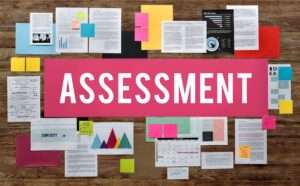Due to the changes happening day by day in the world of technology, the demand for technical experts is increasing rapidly. Businesses in all fields are always looking to hire the best candidates who are experts in their fields. Once the team of expert candidates is ready, they help take the business to new heights.
Due to the change in technology, the old recruitment process is not that effective. Therefore, tests are conducted to measure skills so that competent candidates can be found and hired.
In the blog post, we will talk in detail about why it is necessary to conduct these skill assessment tests, And we will discuss in detail what types of skill assessment tests are conducted, what their benefits are, Also, what is the effect of the skill assessment test on job seekers?

Section 1: The Need for Skill Assessment Tests
1.1 The Evolving Tech Industry
The tech industry is marked by continuous advancements, from artificial intelligence and machine learning to blockchain and cybersecurity. Consequently, the skills required for tech roles are ever-changing, making it challenging for employers to accurately assess a candidate’s expertise based solely on their resume or interview performance.
1.2 Overcoming the Flaws of Traditional Hiring
The usual way of hiring looks at resumes and interviews, but these methods can be biased and might not give a complete picture of what a candidate can do. Skill assessment tests offer a more objective and data-driven approach, ensuring that candidates are evaluated based on their actual skills and knowledge.
Section 2: Understanding Skill Assessment Tests
2.1 What are Skill Assessment Tests?
Skill assessment tests are evaluations designed to measure a candidate’s proficiency in specific technical areas relevant to the job they are applying for. These tests can take various formats, such as coding challenges, problem-solving exercises, or simulations, tailored to assess the essential skills needed for the tech role.
2.2 Types of Skill Assessment Tests
Coding Challenges: These tests assess a candidate’s programming skills, problem-solving abilities, and coding efficiency.
Technical Problem-Solving: Candidates are presented with real-world scenarios and are required to analyze and propose solutions.
Cognitive and Logical Reasoning: These tests evaluate a candidate’s ability to think critically and logically.
Behavioral and Soft Skills: While primarily focusing on technical skills, some skill assessments also include components to evaluate a candidate’s communication, teamwork, and adaptability.
Section 3: Benefits of Skill Assessment Tests
3.1 Improved Candidate Evaluation
Skill assessment tests provide a holistic view of a candidate’s abilities, allowing employers to identify potential stars who may have been overlooked through traditional hiring methods. This approach ensures that the right candidates are selected based on merit, rather than a subjective impression.
3.2 Time and Cost Efficiency
By automating the initial screening process, skill assessment tests save valuable time and resources for recruiters. Employers can quickly identify top candidates without investing significant hours in reviewing resumes and conducting multiple interviews.
3.3 Enhanced Quality of Hires
With skill assessment tests, employers can significantly reduce the chances of a bad hire. By ensuring that candidates have the necessary technical skills and expertise, companies can build stronger, more capable teams that positively impact productivity and innovation.
3.4 Reducing Unconscious Bias
Traditional hiring methods are susceptible to unconscious bias, leading to underrepresented groups being overlooked. Skill assessment tests rely on objective evaluation criteria, helping to reduce unconscious biases and promote diversity and inclusivity in the tech industry.
Section 4: Implementing Skill Assessment Tests Effectively

4.1 Designing Relevant Assessments
Employers must tailor skill assessment tests to align with the specific requirements of the job role. A well-designed assessment should accurately reflect the day-to-day challenges that the candidate will face in the position.
4.2 Integrating Practical and Real-World Scenarios
To gauge a candidate’s practical problem-solving abilities, incorporating real-world scenarios into skill assessment tests is crucial. This ensures that candidates are not only technically proficient but can apply their knowledge effectively.
4.3 Collaboration with HR and Tech Teams
Successful implementation of skill assessment tests requires collaboration between HR professionals and the tech teams. Close cooperation ensures that assessments accurately reflect the job’s technical demands and the company’s overall goals.
Section 5: The Impact on Job Seekers
5.1 Showcasing Technical Skills
Skill assessment tests allow job seekers to demonstrate their technical capabilities beyond what a traditional resume can convey. This empowers candidates to showcase their true potential, even if they lack extensive work experience.
5.2 Building Confidence
For job seekers, passing a skill assessment test can boost confidence in their abilities, motivating them to pursue more challenging opportunities and advance their careers.
Section 6: Skill Assessment Tests in the Future
6.1 Integrating AI and Machine Learning
As technology advances, skill assessment tests will likely incorporate AI and machine learning algorithms, allowing for more personalized evaluations and improved accuracy in predicting a candidate’s fit for a role.
6.2 The Rise of Online Proctoring
To maintain the integrity of skill assessment tests, online proctoring solutions will become increasingly prevalent. These tools ensure that candidates complete tests honestly and without external assistance.
6.3 Continuous Learning and Upskilling
Skill assessment tests can also serve as a tool for continuous learning and upskilling for existing employees. By identifying knowledge gaps, employers can offer targeted training programs to enhance their teams’ skills.
Read more about :
What are the global workforce’s hopes and fears for 2023?
A Dynamic Dedicated Development Team for Business Development
Five Key Steps for Recruiting High-Quality Software Developers
Conclusion
Skill assessment tests are transforming the tech recruitment landscape, providing a more effective and objective way to identify top talent. By overcoming the limitations of traditional hiring methods, these assessments offer benefits to both employers and job seekers, leading to better quality hires and more fulfilling careers. As technology continues to advance, skill assessment tests will evolve, becoming a cornerstone of the tech industry’s pursuit of excellence in talent acquisition and development. Embracing skill assessment tests as part of the recruitment process will undoubtedly shape the future of tech recruitment, propelling businesses towards greater success in the dynamic digital era.


